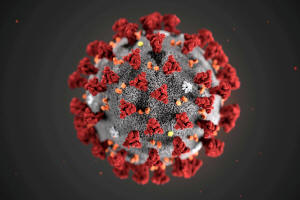Echoes of neurodegenerative disease in fatal COVID-19; sleep woes may
add risk
 Send a link to a friend
Send a link to a friend
 [June 22, 2021]
By Nancy Lapid [June 22, 2021]
By Nancy Lapid
(Reuters) -The following is a roundup of
some of the latest scientific studies on the novel coronavirus and
efforts to find treatments and vaccines for COVID-19, the illness caused
by the virus.
COVID-19 brains show inflammation, "circuitry" problems
The brain inflammation and impaired "brain circuitry" seen in people who
die of COVID-19 look a lot like what doctors see in the brains of people
who die of neurodegenerative conditions such as Alzheimer's disease and
Parkinson's disease, researchers reported on Monday in the journal
Nature. Analyses of brain tissue from eight people who died from
COVID-19 and 14 others who died from other causes showed "striking
changes" in the COVID-19 patients' brains, Stanford University
researcher Tony Wyss-Coray told Reuters. His team at Stanford, with
colleagues at the University of Saarbruecken in Germany, analyzed
thousands of genes in each of 65,309 individual cells taken from the
brain-tissue samples. Genes involved with cognition, schizophrenia and
depression were more often "turned on" in the COVID-19 patients' brains,
they found. "There also were signs of distress in neurons in the
cerebral cortex, the brain region that plays a key role in
decision-making, memory and mathematical reasoning," the researchers
said in a statement. "These neurons ... form complex logic circuits that
perform those higher brain functions." Wyss-Coray said his team could
not find the virus itself in the brain, which suggests that "virus
infection in the rest of the body could be enough to cause neurological
symptoms, even in people who do not die from the disease." The findings,
Wyss-Coray noted in a statement, "may help explain the brain fog,
fatigue and other neurological and psychiatric symptoms of long COVID."

Poor sleep history linked with more severe COVID-19
Poor sleep habits may be linked with higher risk for severe illness in
patients with COVID-19, according to Harvard University researchers.
They analyzed survey responses from more than 46,000 participants in the
long-term UK Biobank study, including 8,422 who tested positive for
COVID-19. Participants had answered questions from 2006 to 2010 about
sleep duration, daytime sleepiness, insomnia and body clocks. For the
new study, based on their responses, the researchers assigned scores
ranging from 0 to 6, with higher scores indicating multiple poor sleep
"traits." In participants with COVID-19, poor scores were associated
with higher odds of death. This was true even after researchers
accounted for issues known to be risk factors for poor COVID-19 outcomes
such as sleep apnea, obesity and smoking, they reported on Friday in the
journal Clinical Infectious Diseases. Even people with two occasional or
one frequent poor sleep trait appeared to experience higher risks for
hospitalization and death, although the difference was not statistically
significant and more study is needed to confirm the finding, the
researchers said. Poor sleep affects the immune system and blood
clotting, both of which are key to the body's fight against COVID-19,
and "tracking sleep behavior may have importance in identifying those at
increased risk for COVID-19 mortality and hospitalization," the authors
said.
[to top of second column]
|

The ultrastructural morphology exhibited by the 2019 Novel
Coronavirus (2019-nCoV), which was identified as the cause of an
outbreak of respiratory illness first detected in Wuhan, China, is
seen in an illustration released by the Centers for Disease Control
and Prevention (CDC) in Atlanta, Georgia, U.S. January 29, 2020.
Alissa Eckert, MS; Dan Higgins, MAM/CDC/Handout via REUTERS.

Most COVID-19 antibody drugs likely work against
variants
Most COVID-19 antibody drugs that are approved for emergency use in
the United States - and some that are still in development - are
likely to protect against variants of the novel coronavirus, new
data suggests. In test tube experiments, and in mice and hamsters,
researchers exposed the antibodies, alone and in combinations, to
"engineered" versions of mutated virus and to actual virus obtained
from patients infected with Alpha, Beta, or Gamma variants - first
identified in Britain, South Africa and Brazil, respectively - or
variants first seen in New York, California or India. Some
individual drugs appeared to lose effectiveness against the variants
in test tubes - but in the animals, low doses of most of the drugs,
given in combinations, were protective, the researchers reported on
Monday in the journal Nature. Another advantage of the combinations
is that they "seemed to prevent the emergence of resistant viruses,"
study co-author Jacco Boon of Washington University School of
Medicine in St. Louis said in the statement. "Resistance arose with
some of the monotherapies, but never with combination therapy."
(Reporting by Nancy Lapid; Editing by Will Dunham)
[© 2021 Thomson Reuters. All rights
reserved.] Copyright 2021 Reuters. All rights reserved. This material may not be published,
broadcast, rewritten or redistributed.
Thompson Reuters is solely responsible for this content.


 |